TSA ID Requirements
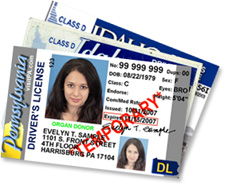 Those who wish to fly without ID cards have but a few more days.
Those who wish to fly without ID cards have but a few more days.
Beginning Saturday, June 21, 2008 passengers that willfully refuse to provide identification at security checkpoint will be denied access to the secure area of airports. This change will apply exclusively to individuals that simply refuse to provide any identification or assist transportation security officers in ascertaining their identity.
This new procedure will not affect passengers that may have misplaced, lost or otherwise do not have ID but are cooperative with officers. Cooperative passengers without ID may be subjected to additional screening protocols, including enhanced physical screening, enhanced carry-on and/or checked baggage screening, interviews with behavior detection or law enforcement officers and other measures.
Now, I’m as anti-TSA as the next guy and still maintain that being subject to search by federal agents absent reasonable suspicion, much less probable cause, is a violation of my 4th Amendment rights. But having to show identification so that it can be ascertained that I share a name with the guy on the boarding pass? No problem.
Daniel Solove begs to differ.
I’m one who routinely presents my ID to the TSA officials at the airport. I think that the ID requirement is stupid, but I just want to get to my plane and not be hassled. But others, for reasons of conscience or protest, do not want to present their ID at the airport. This new TSA rule strikes me as problematic from a First Amendment standpoint, since it seems to be designed to target those who don’t present ID for expressive reasons. As such, this new TSA requirement might be a form of viewpoint discrimination.
Although the First Amendment doesn’t restrict the TSA from requiring IDs in order to board an airplane, it does restrict using the ID requirement to penalize people who engage in expressive conduct. Because the TSA requirement seems to be targeted to this kind of expressive conduct (hence the exception for lost or stolen IDs), it may run afoul of the First Amendment.
I get that there’s such a thing as symbolic speech. You know, F- the draft and other such noble sentiments. But what exactly is the idea conveyed by not showing one’s drivers’ license? I got my license suspended? I’m under 16? I’m afraid the camera will steal my soul? F- you? Wouldn’t it be more expressive to say, “It really pisses me off that I have to show you ID to fly” to the agent while complying with the request?
I do, however, find it troubling that the regulation has a “is nice to the authorities” exemption. The freedom to be crabby with annoying government officials strikes me as much more fundamental to free expression than not showing an ID card.

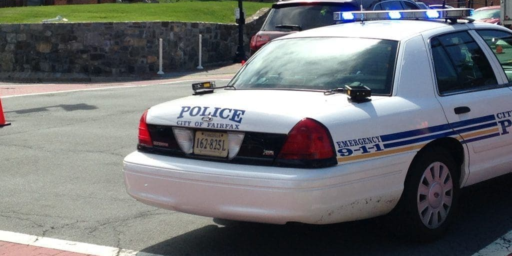
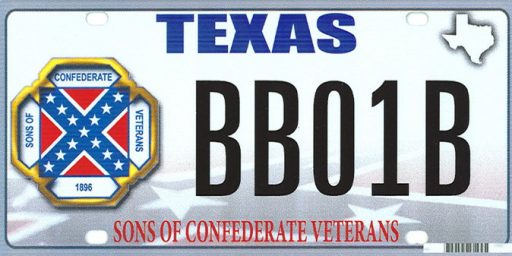
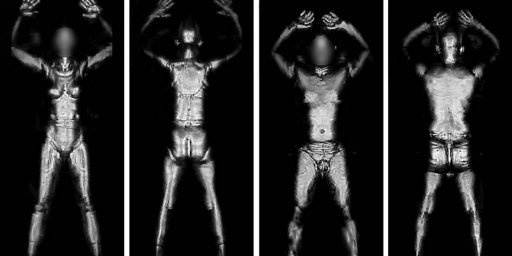
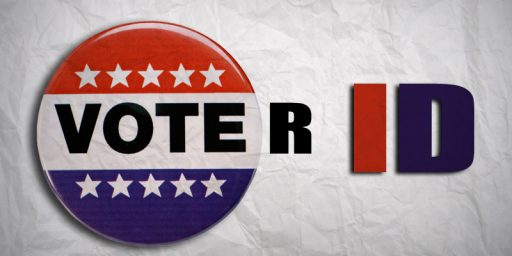
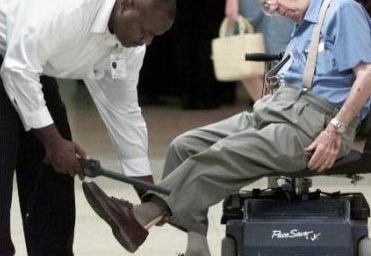
What a surprise! After spending years at doing their best to immitate the Keystone Cops while providing “security”, they finally do something that actually improves security.
And how many years did it take them to come up with this advanced security idea?
Air flights have been and will continue to be the number one target for terrorists. For effort expended the potential for catastrophic property damage and loss of life is very high. Knowing that it will always be a target it’s security should be a priority.
The minor inconvenience and minor intrusion into privacy are trivial. Local authorities will do more damage to our constitutional rights than the TSA ever will. But the TSA was formed during the Bush years (with congressional approval) so it must be bad and it’s employees insulted on a regular basis.
The more serious people out here can understand the difference between reasonable security and constitutional rights violations.
I am very concerned about infringement upon personal liberties since 9/11, but have no problem whatsoever with presenting my ID to enter secure areas of the airport or to fly. We don’t have a “right” to access secure areas or a right to fly.
It’s not a question of whether there’s expressive content. It’s a simple time, place, and manner restriction. If you think the tolls over the George Washington Bridge are too high there are all sorts of ways to express that thought. Getting into an argument with the toll-taker is not protected by the First Amendment.
Steve – what about security for a high school sporting event – lots of people esp young people and zero security – or a mall
I don’t have a problem w/ this requirement but I don’t think airlines will be the biggest terror tool b/c everyone is so on edge about 9/11 and if a terrorist(s) tried to take over a plane, everyone would do all they could to stop it.
Imagine if there was a first amendment exception to the ID rule. It would follow that the TSA shouldn’t be able to impose additional scrutiny toward those exercising such a freedom. Otherwise the freedom of speech would be chilled (e.g. if you knew exercising your freedom of speech would result in a strip search, would you?). So the next logical conclusion would be that a terrorist would not use an ID as it would be one less thing to catch them up.
I recall reading (perhaps at volokh’s place) that one of the reasons that the TSA won the court case of the ID requirement was that a person could still board the plane without an ID as long as they agreed to be subjected to additional search procedures. Now the TSA has essentially said “Uh, guess not.”
Further, there is no extra security provided by allowing people who “lost” their ID on board but not allowing people who don’t wish to provide them on board. This is just stupid. Do they really think a terrorist is going to chose the “I don’t wish to provide” route rather than “I lost it” route?
Presumably, there’s a means of checking on people who say they’ve lost their ID. Surely, TSA has a means of accessing, say, the Virginia DMV to check my driver’s license photo.
Sad!
I work everyday in the labs that develop the technologies to locate the threats to this country. When I speak with the Scientist and Engineers. . . .You have no idea how great a job TSA and DHS are doing.
People are lucky that they don’t get searched using the train.
When the remnants of a plane are falling from the sky, the people that survive the initial blast are all probably thinking “I wish they would have searched everyone a little more thoroughly.
James: if there’s a means of checking on people who say they’ve lost their ID, then there is a means of checking on people who refuse to present their ID. And given how easy it is for someone who doesn’t want to present an id to “lose” it, this is a fairly obvious sign of “security theatre”
Two thoughts on this topic:
1. The government has to deal with immigration issue and whether or not to give illegal aliens driver’s licenses or some other form of identification, or else lose their dollars from the flying industry and their ability to move about the country.
2. People are free to protest and not show their IDs, however the airlines and airports are also free to deny them service, it has to be a two way street.